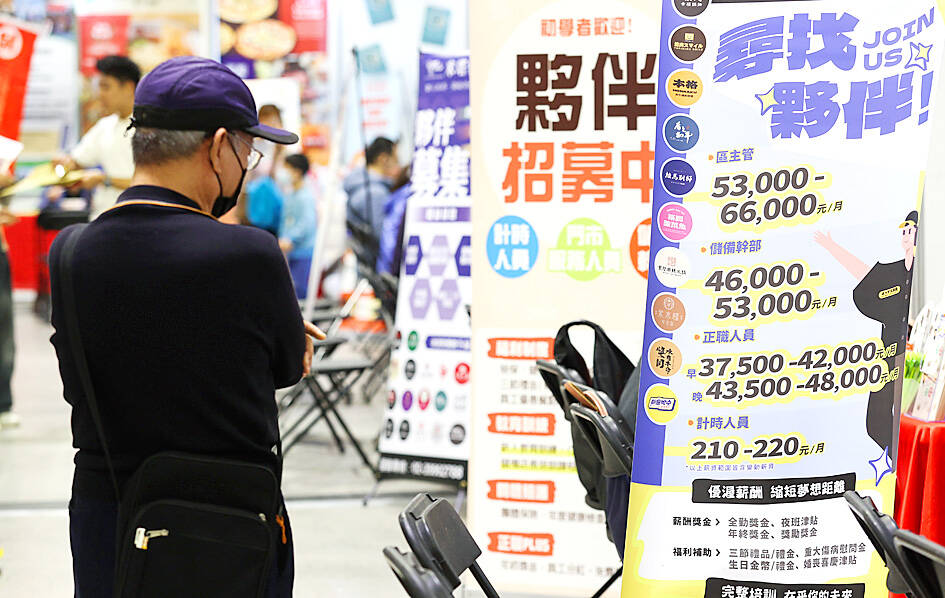The wage growth in Taiwan’s industrial and service sectors in April accelerated from the previous month, driven by a surge in manufacturing demand ahead of potential US tariff hikes — a sign that the labor market held healthy even as global trade tensions loom.
Average regular wages gained 3.22 percent from a year earlier to NT$47,807 (US$1,598) in April, compared with 3.03 percent growth in the previous month, the Directorate-General of Budget, Accounting and Statistics (DGBAS) said yesterday.
Total wages — including performance-based commissions, bonuses and overtime pay — increased 3.3 percent to NT$55,546, the DGBAS said.

Photo: CNA
April’s wage expansion coincided with a sharp uptick in overtime hours in the manufacturing sector, DGBAS Census Department Deputy Director Tan Wen-ling (譚文玲) said at a news conference in Taipei.
Factory workers clocked an average of 17.8 overtime hours in April, the most in eight-and-a-half years, while those in the electronics components industry, central to Taiwan’s export-driven economy, worked 27.9 overtime hours on average, a record high in 46 years, Tan said.
Overtime pay in April averaged NT$2,423, the highest for the month in history, DGBAS data showed.
The remarkable performance had much to do with front-loading of orders ahead of the implementation of US President Donald Trump’s tariffs, Tan said, adding that the gains might prove temporary if the Trump administration presses ahead with drastic tariff hikes across the world next month following a 90-day pause.
“If higher tariffs kick in after the 90-day respite, Taiwan could see a pullback in demand in the second half of the year,” Tan said. “If the tariff shifts are modest, their impact would be very limited.”
Real wages, adjusted for inflation, climbed 1.16 percent in April, the biggest rise in five years, DGBAS data showed.
The jump in compensation highlights a stretch where wage growth is outpacing consumer prices now for the 13th consecutive month, offering some relief to workers after years of tepid real income growth, Tan said.
For the January-April period, real regular wages rose 0.9 percent year-on-year, the first positive reading for the time frame in four years, the DGBAS said.
The median regular wage, a more telling measure of broad-based compensation, stood at NT$38,208 in April, underscoring that many workers still earn well below the average, Tan said.
Meanwhile, wage adjustments grew more widespread across different sectors in Taiwan. Roughly 32.5 percent of companies raised regular pay this year, after 33.9 percent did so last year — the highest proportion in 24 years, the agency said.
Half cited workers’ improving performances as the reason, while nearly 40 percent pointed to minimum wage increases, it said, adding that enhanced profitability ranked the third most common driver.
The data suggested that sustained wage growth might depend on how trade negotiations and tariff developments unfold in the months ahead, Tan said.

When Lika Megreladze was a child, life in her native western Georgian region of Guria revolved around tea. Her mother worked for decades as a scientist at the Soviet Union’s Institute of Tea and Subtropical Crops in the village of Anaseuli, Georgia, perfecting cultivation methods for a Georgian tea industry that supplied the bulk of the vast communist state’s brews. “When I was a child, this was only my mum’s workplace. Only later I realized that it was something big,” she said. Now, the institute lies abandoned. Yellowed papers are strewn around its decaying corridors, and a statue of Soviet founder Vladimir Lenin

UNCERTAINTIES: Exports surged 34.1% and private investment grew 7.03% to outpace expectations in the first half, although US tariffs could stall momentum The Chung-Hua Institution for Economic Research (CIER, 中華經濟研究院) yesterday raised its GDP growth forecast to 3.05 percent this year on a robust first-half performance, but warned that US tariff threats and external uncertainty could stall momentum in the second half of the year. “The first half proved exceptionally strong, allowing room for optimism,” CIER president Lien Hsien-ming (連賢明) said. “But the growth momentum may slow moving forward due to US tariffs.” The tariff threat poses definite downside risks, although the scale of the impact remains unclear given the unpredictability of US President Donald Trump’s policies, Lien said. Despite the headwinds, Taiwan is likely

UNIFYING OPPOSITION: Numerous companies have registered complaints over the potential levies, bringing together rival automakers in voicing their reservations US President Donald Trump is readying plans for industry-specific tariffs to kick in alongside his country-by-country duties in two weeks, ramping up his push to reshape the US’ standing in the global trading system by penalizing purchases from abroad. Administration officials could release details of Trump’s planned 50 percent duty on copper in the days before they are set to take effect on Friday next week, a person familiar with the matter said. That is the same date Trump’s “reciprocal” levies on products from more than 100 nations are slated to begin. Trump on Tuesday said that he is likely to impose tariffs

HELPING HAND: Approving the sale of H20s could give China the edge it needs to capture market share and become the global standard, a US representative said The US President Donald Trump administration’s decision allowing Nvidia Corp to resume shipments of its H20 artificial intelligence (AI) chips to China risks bolstering Beijing’s military capabilities and expanding its capacity to compete with the US, the head of the US House Select Committee on Strategic Competition Between the United States and the Chinese Communist Party said. “The H20, which is a cost-effective and powerful AI inference chip, far surpasses China’s indigenous capability and would therefore provide a substantial increase to China’s AI development,” committee chairman John Moolenaar, a Michigan Republican, said on Friday in a letter to US Secretary of